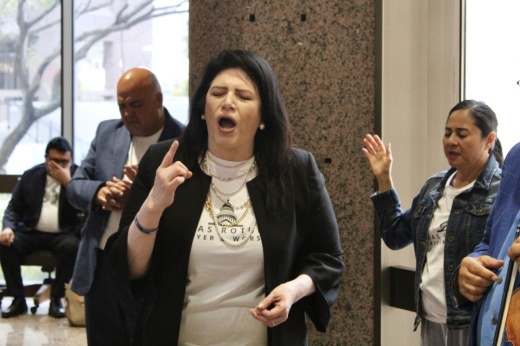The 15-member board gave preliminary approval to the state textbooks, known as Bluebonnet Learning, with an 8-7 vote Nov. 19. The Texas Education Agency and about two dozen other publishers had until 5 p.m. Nov. 20 to revise their proposed materials in response to concerns from board members and the public. The board will take a final vote Nov. 22.
How we got here
The state-developed materials include textbooks and lesson plans for elementary school reading and language arts, kindergarten through eighth grade math, and algebra 1. They were released under House Bill 1605, a 2023 law that overhauled Texas’ public school curriculum standards.
Use of any state-sanctioned materials is entirely optional, but districts that do so would receive up to $60 per student to purchase and print them. Districts currently receive about $171 per student to acquire textbooks, according to the TEA.
Schools could begin using materials approved by the SBOE during the 2025-26 academic year.
Zooming in
Several Texas school districts, including Temple ISD, have piloted the TEA’s elementary-level materials since 2021. TISD teachers and a district administrator traveled to Austin Nov. 18 to testify in support of the state curriculum.
“The curriculum is for all diverse learners, flexible for various teacher expertise and inclusive for families,” kindergarten teacher Jomeka Gray told the board. “I am confident that my students will continue to have positive outcomes as they move forward in their academic journey.”
Lisa Adams, a deputy superintendent for TISD, said students on campuses that implemented the state textbooks began “outperforming their grade-level peers” within the first few months of the pilot program.
“They've made a difference for our students and teachers in TISD, and I would ask that you put them on the [approved] list, so they would continue to be an option,” Adams said.
Ahead of the preliminary vote, SBOE member Kevin Ellis, R-Lufkin, said the Bluebonnet materials would give school districts more options.
“I want to know, does [the curriculum] teach kids to read? That's the most important thing to me,” Ellis said Nov. 19. “I've also heard a lot about the rigor, about the grade level, and I think those are aspects that are up to a curriculum director who decides if this is right for their district.”
The other side
Board member Staci Childs, D-Houston, said she thinks the state reading materials are generally high-quality, but didn’t want to support them because of the Bible stories woven throughout.
“I didn't hear enough about how we can withstand an Establishment Clause claim if one is brought up—if the State Board of Education is sued or the commissioner is sued—for me to feel comfortable yet,” Childs said.
The Establishment Clause is a provision of the First Amendment that prohibits the government from establishing a religion.
Parents should be able to teach their children about a religion, or none at all, without interference from their public schools, others testified.
“I am a Christian, and I do believe that religion is a part of our culture, but our nation does not have a religion. We're unique in that,” said Mary Lowe of Families Engaged for Effective Education, a public education advocacy group. “I do not think that our school districts should imply or try to overtly impress to young, impressionable children that [Texas] does have a state religion.”
Frequent references to the Bible could alienate non-Christian students, some said Nov. 18, arguing that other major religions are not depicted equally.
Abby Burnham, a Jewish parent, said she faced “repeated attempts to promote Christian ideologies” as a child in Texas public schools.
“I vividly remember when I expressed discomfort as a student and a teacher told me that I should just get used to it, that that is the world that I live in,” Burnham said. “That moment stayed with me—not because it reflects the fairness or diversity I believe in, but because it made me feel like I don't belong.”
During remarks to the SBOE Nov. 20, TEA Commissioner Mike Morath said that while he is not a legal expert, he did not think the state textbooks would violate the Establishment Clause.
“I have not seen any Bluebonnet [material] that uses solely Christian religious references,” Morath told board members. “Any assertion of that is incorrect.”

The majority-Republican SBOE was split during the preliminary vote Nov. 19. Republicans Evelyn Brooks of Frisco, Patricia Hardy of Fort Worth and Pam Little of Fairview joined the board’s four Democrats in opposition to the state curriculum.
Hardy said she was concerned that the state reading materials are too advanced for elementary school students and sometimes discuss “very dark subjects.”
“My concern is that we take care of the reading problem, and I simply do not think that this is the program that will take care of making all the children learn to read,” Hardy said Nov. 19.
Brooks said she voted against the state textbooks because they were an “experiment” and did not use proven teaching methods.
“The students, the schools who will use this resource, they are the experiment. They will be the ones who will determine if this is effective or not,” Brooks said. “The TEA is in the business of making sure that our students are achieving, that they can read, that they can write... and we're not doing that job very effectively.”
Board member Will Hickman, R-Houston, who voted for the materials, said he felt the Bible stories would help teach students important concepts and prepare them to enter society.
“There's a line between indoctrination or evangelism and education,” Hickman said. “In my view, these stories are on the education side and are establishing cultural literacy. There's religious concepts like the Good Samaritan and the golden rule that all students should be exposed to.”
The board will take a final vote on the Bluebonnet textbooks and over 100 other proposed instructional materials Nov. 22.





